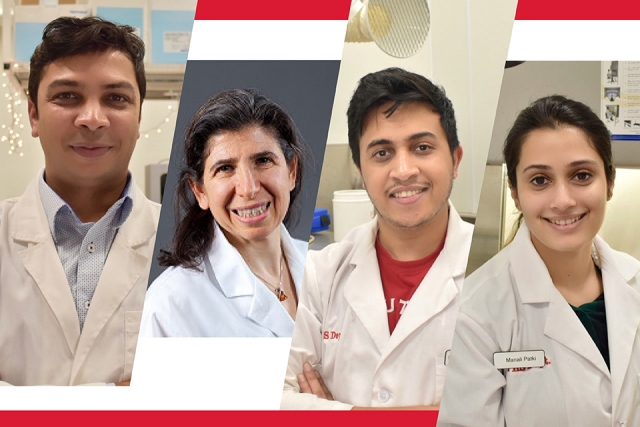
L to R: Ketan D. Patel, Ph.D., Assistant Professor of Pharmaceutical Sciences; Sandra E. Reznik, M.D., Ph.D., Professor of Pharmaceutical Sciences; and graduate students Siddhant Palekar and Manali Patki
A team of professors from the College of Pharmacy and Health Sciences at St. John’s University have applied for a patent for a self-injectable, extended-release dosage of the antiviral medication Remdesivir (RDV)—developed by the biopharmaceutical company Gilead Sciences, Inc.—for the treatment of COVID-19. RDV, a drug that once offered hope against Ebola Virus Disease, is now being explored as a current and effective medication for COVID-19.
Ketan D. Patel, Ph.D., Assistant Professor, Department of Pharmaceutical Sciences; his graduate students, Manali Patki and Siddhant Palekar; and Sandra E. Reznik, M.D., Ph.D., Professor, Department of Pharmaceutical Sciences, have designed and developed a product to deliver RDV that has the potential to be an easily accessible and affordable therapeutic alternative. Currently, RDV is available for emergency use as an intravenous injection/infusion. Since it requires an intravenous injection, skilled medical personnel in a clinical setting are required to administer the dose.
“As the world awaits the development and distribution of a vaccine, we are researching ways to deliver an easily accessible and affordable therapeutic alternative,” stated Dr. Patel. “Presently, a patient who is COVID-19 positive is left with no choice other than getting admitted to the hospital and receiving the injection. We have developed a dosage form (SelfExRem) of RDV that a COVID-19 positive patient can self-administer, either manually, by autoinjector, or with the help of a nonprofessional individual. Due to the extended release nature of this formulation, it may require considerably less frequent dosing than currently available intravenous RDV. Additionally, it might enable medical professionals and other high-risk populations to preemptively take the medication as a prophylactic.”
SelfExRem is composed of FDA-approved biocompatible inactive ingredients well within approved limits. “Unlike intravenous injections, the ability to self-administer helps reduce person-person contact, minimizes exposure to clinic hospital environments, and reduces dosing frequency, thus helping to minimize health-care costs,” Dr. Patel explained.
Dr. Reznik added, “SelfExRem offers much better patient compliance and has the potential to improve the availability of RDV to patients at an early stage of infection and for those with limited access to a hospital or clinical facilities.” Dr. Reznik is also Director of the Perinatal Pathology section at Albert Einstein College of Medicine in Bronx, NY.
“SelfExRem, with self-injectability and extended-release properties, could be of great value in improving our therapeutic arsenal against COVID-19,” said Manali Patki, a graduate student in Dr. Patel’s laboratory. “SelfExRem showed continuous release of RDV over two to four days in our in vitro experiments, which indicates that only two to three injections may be sufficient for COVID-19 treatment.”
Siddhant Palekar, another graduate student, was involved in assessing the force required to inject SelfExRem. Siddhant remarked, “A novel technology such as SelfExRem is the need of the hour from the patient’s standpoint, with an added advantage of being easily injectable, manually or by an autoinjector of any make. Autoinjection via prefilled syringe helps reduce trypanophobia and errors in drawing up the dose.”
Currently, the US patent application (63/082,322) for SelfExRem is pending. Drs. Patel and Reznik plan to conduct a pharmacokinetic study in animals and seek a collaborator to test SelfExRem in the SARS-CoV-2 animal model before moving forward with clinical application.
“SelfExRem is certainly a translational formulation and we do not see any technology-related problem with its large-scale manufacturing and distribution,” said Dr. Patel.
